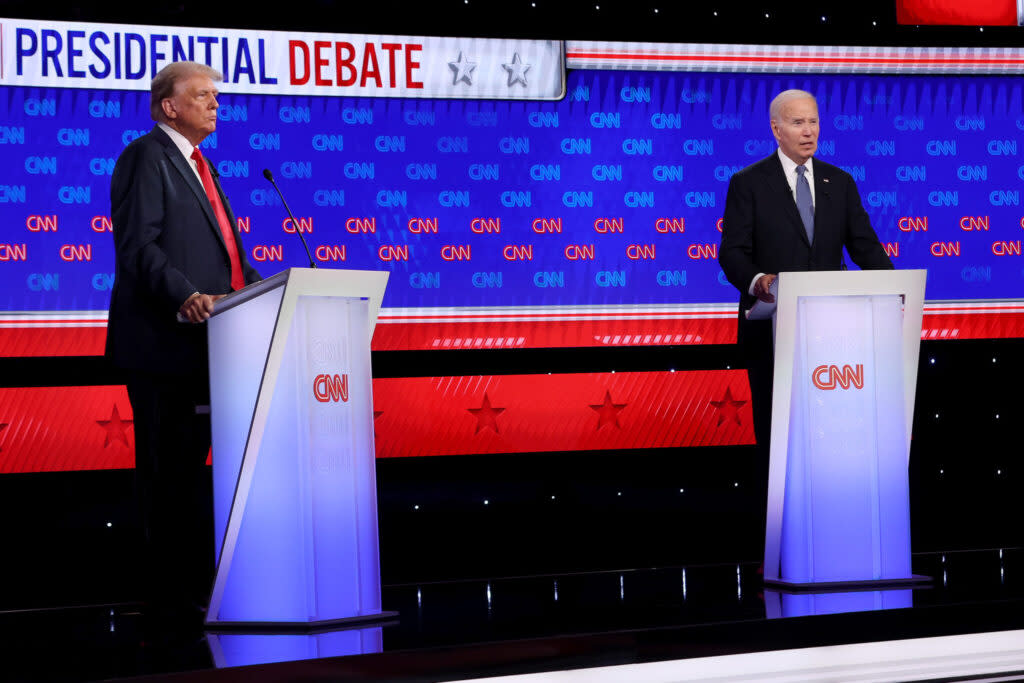The debate about the value of presidential debates

- Oops!Something went wrong.Please try again later.
- Oops!Something went wrong.Please try again later.
- Oops!Something went wrong.Please try again later.
- Oops!Something went wrong.Please try again later.
U.S. President Joe Biden, right, and Republican presidential candidate, former U.S. President Donald Trump, participate in the CNN Presidential Debate at the CNN Studios on June 27, 2024 in Atlanta, Georgia. (Photo by Justin Sullivan/Getty Images)
There was a time in American history in which it was a virtual prerequisite for any serious presidential candidate that they look good on a horse.
Up until the 20th century, it was also generally the case that actual campaigning was considered beneath a presidential candidate’s dignity. Instead, nominees were selected at party conventions just a couple of months prior to the election and actual campaigning was handled by surrogates.
William McKinley famously “campaigned” in 1896 by holding forth from the front porch of his small-town Ohio home for those who might come to listen.
The process evolved in the early 20th Century with the advent of radio and easy train travel, but it was also still the case that the vast majority of Americans, despite having elected him four times in 1932, ’36, ’40 and ’44, had no idea that Franklin Roosevelt – arguably the most important and successful chief executive in American history – labored under a severe physical and health disabilities.
Television, of course, ushered in a dramatic sea change – most notably with the advent of the televised presidential debate.
In 1960, Democrat John Kennedy narrowly defeated Republican Richard Nixon in an electoral win that was widely attributed to their respective TV debate performances. Nixon was generally perceived as having won the first debate by radio listeners, but he’d been ill and had a lousy makeup job and the contrast with the handsome, tanned and rested Kennedy proved fatal to his chances with millions of viewers.
The nation did without presidential debates from 1964 to 1972, but since 1976, they’ve been a regular – some might say unavoidable – part of the electoral process.
For better or worse, a goodly number of Americans – or, at least, many of the influencers who seem to dominate the administration of and reporting on elections – have decided that the public must have a chance to examine candidates, as the saying goes, “up close and personal.” This has come to mean that candidates must wrestle with the stress of answering unscripted questions in a limited time while under the hostile glare of both their opponent and the hot lights of high-def television.
Interestingly, despite the widespread acceptance that debates are essential, and that any candidate who refuses to participate is “ducking” their opponent, over the course of a dozen elections – 13 if you count Nixon-Kennedy – it’s devilishly hard to think of any debate that really revealed anything of particular note about the candidates, or for that matter, the presidencies that the various winners would ultimately pursue.
Oh sure, there have been gaffes and one-liners, but for the most part, presidential debate performances have – much like a candidate’s posture while seated on a horse – ultimately revealed very little of true relevance about the participants.
In 1976, Jimmy Carter was thought to have trounced Gerald Ford, who made a gaffe in describing the status of eastern Europe, but Carter’s presidency was largely unsuccessful.
Ronald Reagan completely forgot the subject he was addressing during a 1984 debate with Walter Mondale for one painful moment, but voters scarcely noticed, and he remained popular throughout his second term.
George H.W. Bush was pummeled by critics for the nervous habit of repeatedly looking at his watch during one of his debates, but again, what that had to do with the success or failure of his presidency remains a mystery.
Notwithstanding the highly questionable value of debates in providing any kind of true indicator of a candidate’s likelihood of success in the White House, some people have decided that last week’s Biden-Trump debate is an exception to the rule.
Indeed, even many progressives who despise Trump and say that his performance included numerous blatant lies, have concluded that Biden – an 81-year-old with a scratchy throat and a lifelong stutter – was insufficiently fleet of mouth during many parts of the 90-minute TV show to be fit for a second term.
Never mind his performance over the last three-and-a-half years or that of his largely scandal-free administration.
Never mind the decisions he’s made, the able people he’s appointed, or the statements of his doctors.
Never mind that almost nothing in the job of a president involves tasks like those found in the uniquely bizarro pressure cooker of a televised debate.
Never mind that Biden, whose mother lived to be a festy 92, arrived in Raleigh at 2:30 in the morning after the debate and then proceeded to deliver an honest and passionate campaign speech to thousands of people hours later.
Instead, say these experts, it’s obvious that Biden isn’t up to doing a job that consists primarily of making sober, behind-the-scenes decisions in a home office, and which they admit he’s been doing exceedingly well right up until the present time.
Will this critical view prevail?
For now, Biden says he’s in it to stay, while Trump – who will turn 82 during a second term if he returns to the White House – is doing everything he can to capitalize on the situation in hopes the Democrats will send in a last-minute replacement for him to savage.
Whatever the outcome, at last check, there was no indication that critics of either candidate believe that horseback riding skills should be added as a criterion for voters to consider between now and November.
The post The debate about the value of presidential debates appeared first on NC Newsline.

